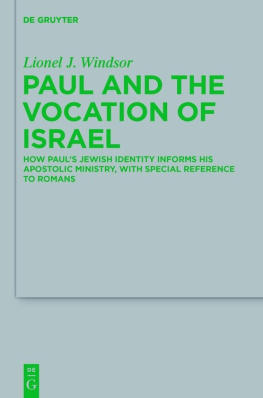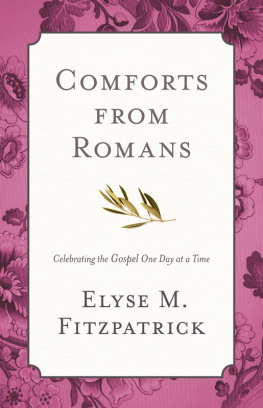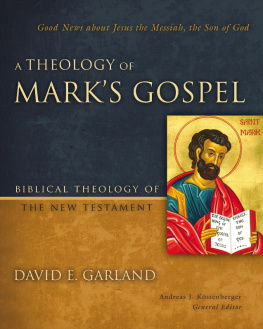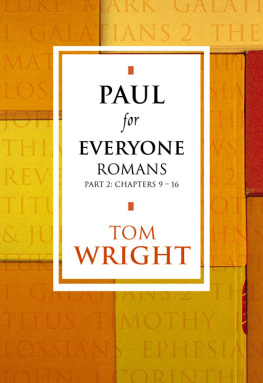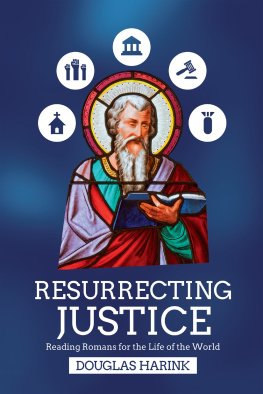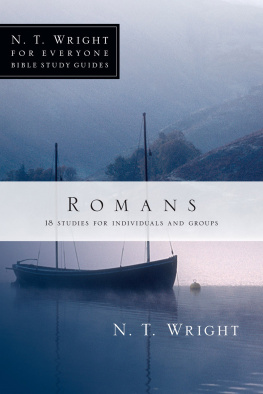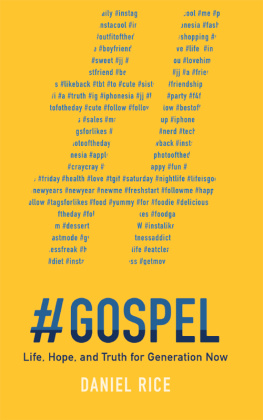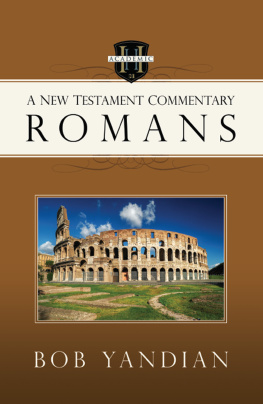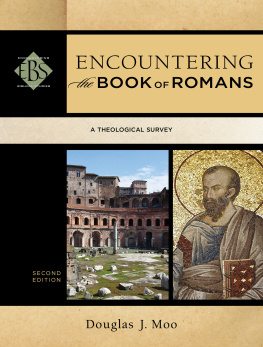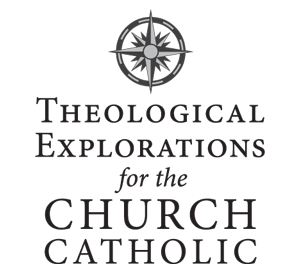1. When in Romans... Watch the Horizon
2. When in Romans... Consider Abraham
3. When in Romans... Give Glory to God
4. When in Romans... Welcome One Another
Series Preface
L ong before it became popular to speak about a generous orthodoxy, John Wesley attempted to carry out his ministry and engage in theological conversations with what he called a catholic spirit. Although he tried to remain united by the tenderest and closest ties to one particular congregation (i.e., Anglicanism) all his life, he also made it clear that he was committed to the orthodox Christianity of the ancient creeds, and his library included books from a variety of theological traditions within the church catholic. We at Nazarene Theological Seminary (NTS) remain committed to the theological tradition associated with Wesley but, like Wesley himself, are very conscious of the generous gifts we have received from a variety of theological traditions. One specific place this happens in the ongoing life of our community is in the public lectures funded by the generosity of various donors. It is from those lectures that the contributions to this series arise.
The books in this series are expanded forms of public lectures presented at NTS as installments in two ongoing, endowed lectureships: the Earle Lectures on Biblical Literature and the Grider-Winget Lectures in Theology. The Earle Lecture series is named in honor of the first professor of New Testament at NTS, Ralph Earle. Initiated in 1949 with W. F. Albright for the purpose of stimulating further research in biblical literature, this series has brought outstanding biblical scholars to NTS, including F. F. Bruce, I. Howard Marshall, Walter Brueggemann, Richard Hays, Terence Fretheim, and Joel Green. The Grider-Winget Lecture series is named in honor of J. Kenneth Grider, longtime professor of theology at NTS, and in memory of Dr. Wilfred L. Winget, a student of Dr. Grider and the son of Mabel Fransen Winget, who founded the series. The lectureship was initiated in 1991 with Thomas Langford for the purpose of bringing outstanding guest theologians to NTS. Presenters for this lectureship have included Theodore Runyon, Donald Bloesch, Jrgen Moltmann, Robert Jenson, and Amy Plantinga Pauw.
The title of this monograph series indicates how we understand its character and purpose. First, even though the lectureships are geared toward biblical literature and systematic theology, we believe that the language of theological explorations is as appropriate to an engagement with Scripture as it is to an engagement with contemporary systematic theology. Though it is legitimate to approach at least some biblical texts with nontheological questions, we do not believe that doing so is to approach them as Scripture . Old and New Testament texts are not inert containers from which to draw theological insights; they are already witnesses to a serious theological engagement with particular historical, social, and political situations. Hence, biblical texts should be approached on their own terms through asking theological questions. Our intent, then, is that this series will be characterized by theological explorations from the fields of biblical studies and systematic theology.
Second, the word explorations is appropriate since we ask the lecturers to explore the cutting edge of their current interests and thinking. With the obvious time limitations of three public lectures, even their expanded versions will generally result not in long, detailed monographs but rather in shorter, suggestive treatments of a given topicthat is, explorations.
Finally, with the language of the church catholic, we intend to convey our hope that these volumes should be pro ecclesia in the broadest sensegiven by lecturers representing a variety of theological traditions for the benefit of the whole church of Jesus Christ. We at NTS have been generously gifted by those who fund these two lectureships. Our hope and prayer is that this series will become a generous gift to the church catholic, one means of equipping the people of God for participation in the missio Dei .
Andy Johnson
Lectures Coordinator
Nazarene Theological Seminary
Kansas City, Missouri
. John Wesley, Sermon 39 , Catholic Spirit, III.4, in Bicentennial Edition of the Works of John Wesley (Nashville: Abingdon, 1985), 2:7995. We know, however, that his public ties with Anglicanism were at some points in his life anything but tender and close.
Preface
T his book on Romans is intended for people who would not normally read a book about Romans. Already there are booksmany booksfor people who do read books about Romans. Stacks of them arrive on a regular basis. Keeping up with them is nearly impossible, even for the most diligent specialist. As the books pile up, the conversation grows increasingly precise, technical, and challenging for the nonspecialist. And thats a problem, because Romans is too important to be turned over to a handful of specialists, however learned and insightful they may be.
What I have tried to offer in this book is an invitation to Romans, focusing on aspects of the letter that I find crucial, both for the first century and for our own. In the introduction I take up a few general questions about the composition of the letter, but the book is not a survey of the letter. It is also not a commentary on the whole of the letter, although I am preparing one of those as well. I have tried to keep the text itself free of the jargon and the clutter of detailed argument that causes readers to slip away for their siestas. The notes should be helpful for those who want to read further on a particular point, but most readers can simply pass over them. The list of suggested readings at the end also provides an entry point for further study.
In the introduction I observe that no one writes alone. Certainly I have not written this book alone. It began with an invitation from Dean Roger Hahn to deliver the Earle Lectures on Biblical Literature at Nazarene Theological Seminary in the fall of 2013. I am grateful to my host and colleague Andy Johnson for the good conversations around those lectures as well as the hospitality extended to me on that occasion. And I appreciate the relationship between the Earle Lectures and Baker Academic, which prompted me to expand and revise those lectures into this book.



